Over 1.5 billion people regularly use Facebook.
And as the social network has grown, the rate at which Facebook shares news, and releases new features and products has accelerated.
It can be a little hard to keep up sometimes.
With this in mind, I’d love to share 11 Facebook tips, tricks, and facts with you.
This post will give you plenty of great stuff to help you get the most out of and better understand Facebook. From why you get shown certain ads and which types of posts get the most engagement, to how closely connected you everyone else on the planet and much, much more.
Let’s go!
1. How to edit your Facebook ad preferences
Have you ever seen a random ad appear in your timeline and wondered why Facebook is showing it to you?
It probably has something to do with your Advert Preferences – a selection of topics Facebook believes you’re interested in based on your profile, Pages you like or engage with, ads you click on and apps and websites you use.
It’s super interesting to understand more about what topics Facebook believes you’re interested in and within your Facebook settings, you can view and even edit these preferences.
To take a peek at your preferences, click on Settings in the top right corner of Facebook:
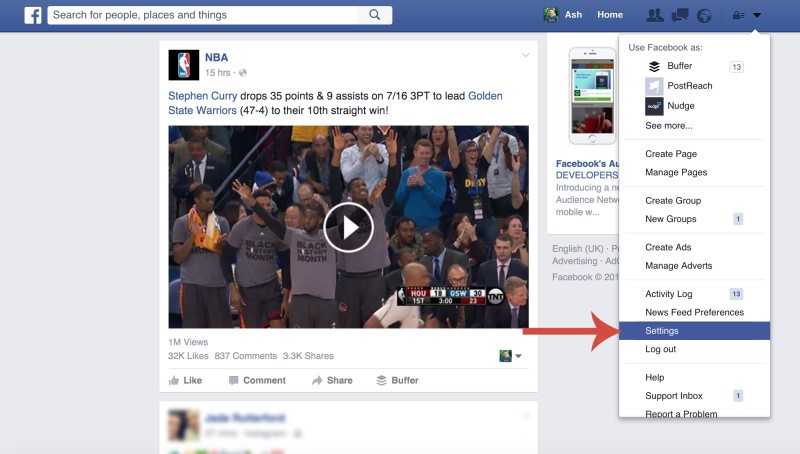
Then select Adverts, and click ‘Edit’ next to ‘Ads based on my preferences’:
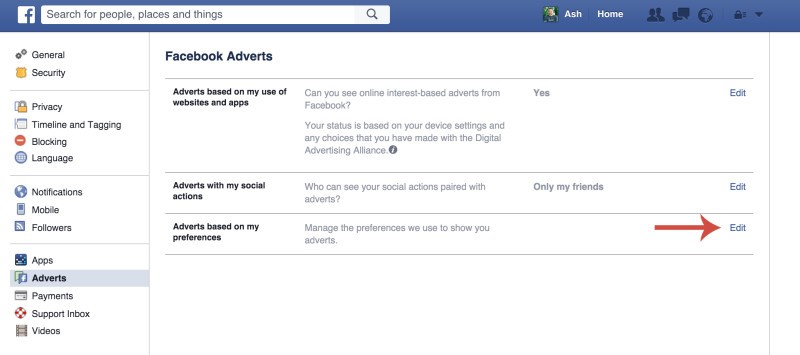
You’ll then see the below screen, click ‘Visit Ad Preferences’ to view and edit your preferences:
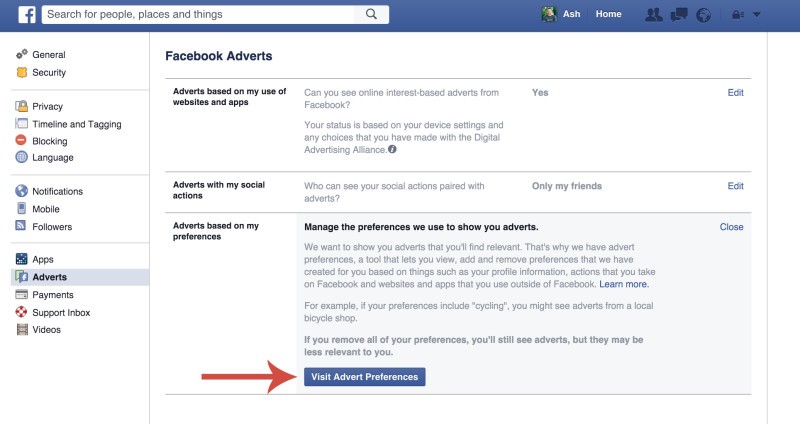
Now, you’ll be taken to the page where you can view and edit all of your ad preferences:
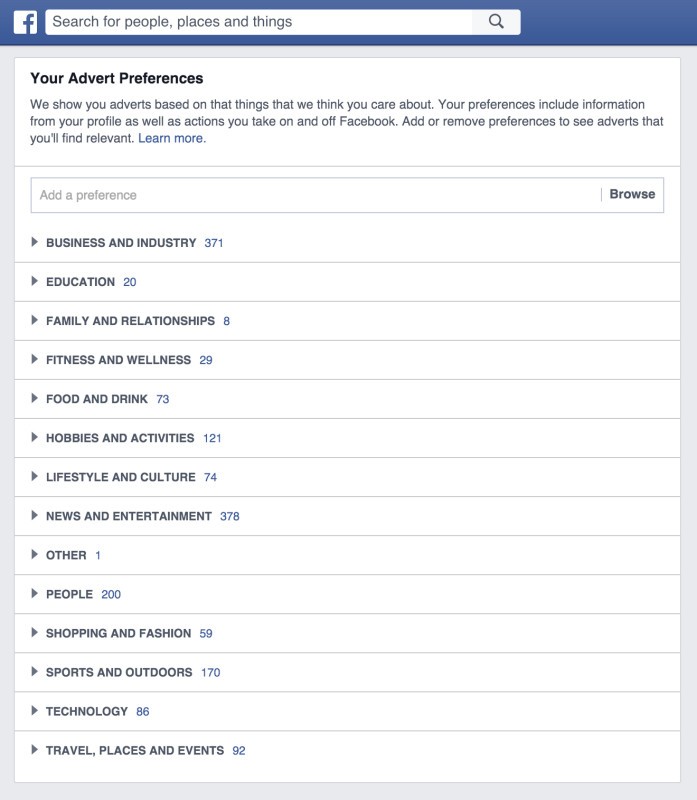
It’s fascinating to dive into each category and check out the topics listed within your preferences. If you’d like to remove any of your preferences, and not receive ads targetted to that topic, you can do so by hovering over and clicking the ‘x’ button:
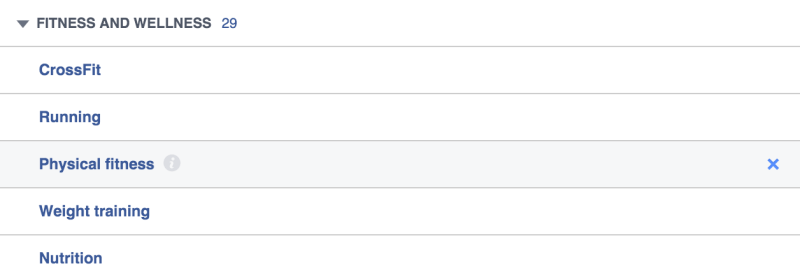
(h/t to Katie Notopoulos over at Buzzfeed for this tip)
2. Images posted via Instagram receive more engagement than native Facebook image posts
A Buzzsumo study of over 1 billion Facebook posts from 3 million brand pages found that images posted to Facebook via Instagram receive more engagement than natively published images.
This is particularly interesting, as often, cross posting from one platform to another results in less engagement (native Facebook video vs. embedding a YouTube video on Facebook, for example).
However, with Instagram being owned by Facebook, there could be some benefits for Facebook by making posts from Instagram more visible in the timeline.
3. The six degrees of separation are shrinking
Six degrees of separation is the theory that everyone in the world is six or fewer steps away, by way of introduction, from any other person. However, thanks to social media, it appears the six degrees are now shrinking.
According to a Facebook study, the six degrees of separation has now become the three-and-a-half degrees of separation, as Facebook explain on their research blog:
Each person in the world (at least among the 1.59 billion people active on Facebook) is connected to every other person by an average of three and a half other people.
The majority of the people on Facebook have averages between 2.9 and 4.2 degrees of separation as the below graph shows:
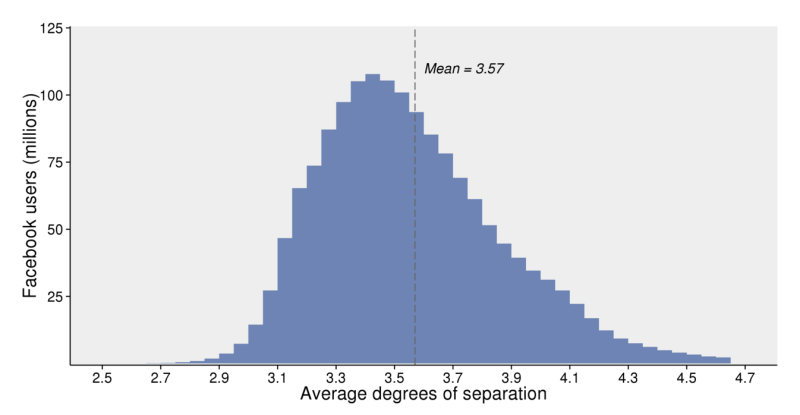
This highlights how social media, and Facebook, in particular, is making us more connected. You can find out more about this and find your degrees of separation over at the Facebook research blog.
Below are my degrees of separation and those of a few Facebook employees:
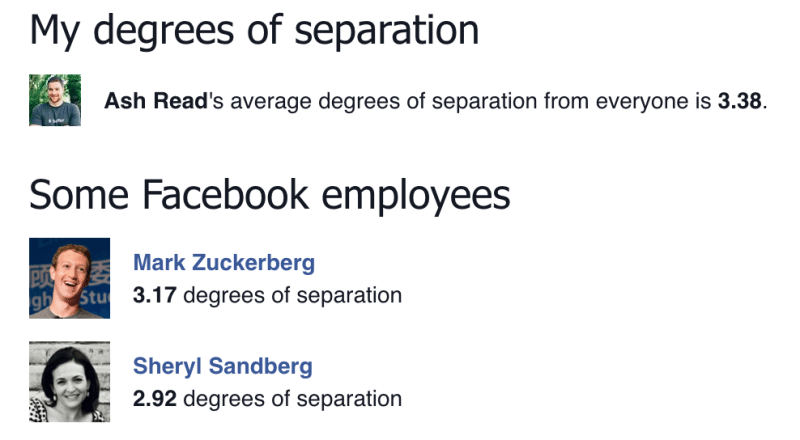
Buffer: 10 Quick Wins for Getting Started Fast With Facebook Video
4. How to download all of your Facebook information
Almost everyone who uses Facebook has lots of information, content and memories stored within the social network.
If you’d like a backup of all your Facebook data – including photos – you can download everything in a few simple steps:
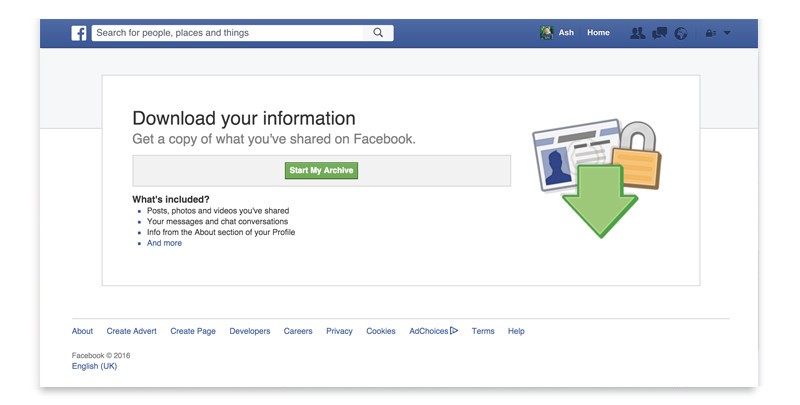
Pro tip: The data that you download from Facebook contains a lot of sensitive information like inbox messages, photos and more. It could be a good idea to keep it all saved in a safe location.
For a full list of what’s included when you download your information, check out this page on the Facebook Help Center.
5. Posts with hashtags receive less engagement than those without
Buzzsumo’s study of over 1 billion Facebook posts discovered that posts on Facebook that include a hashtag receive less engagement than those without hashtags.
Hashtags have become a default way to categorize content across Twitter and Instagram, but not made much impact on Facebook. Do you ever use hashtags on Facebook? I’d love to hear your experience in the comments below this post.
This also highlights the importance of sharing a different message across each social media platform. For example, here’s how I might share the same post on Twitter and Facebook:
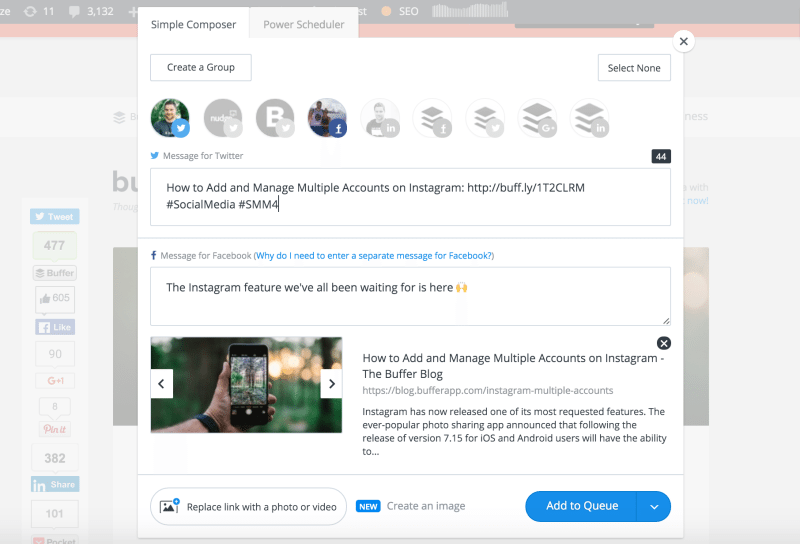
6. How to save links for later
Often, when I browse my Facebook Newsfeed, I spot something that grabs my attention but don’t immediately have time to read a post or watch a video.
If you’re even in this situation, Facebook has a really neat feature allowing you to save a link to come back to later. Here’s a snapshot of my saved content:
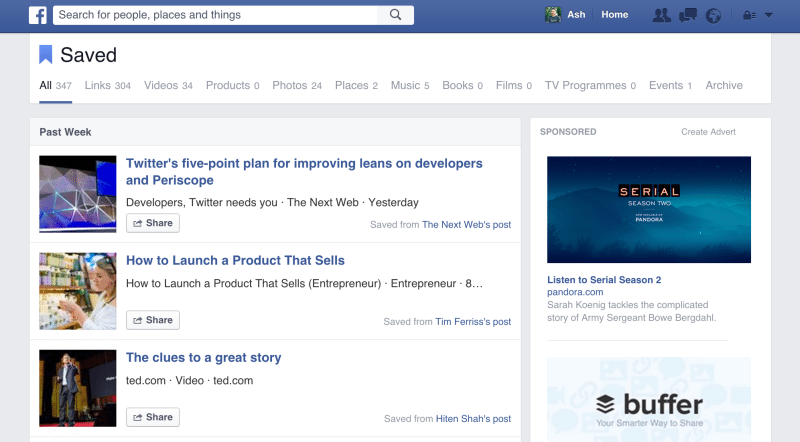
If you see something in your timeline that you’d like to save for later, you can click on the drop-down menu in the top right corner and click ‘Save Link.’
Here’s how it looks on desktop:
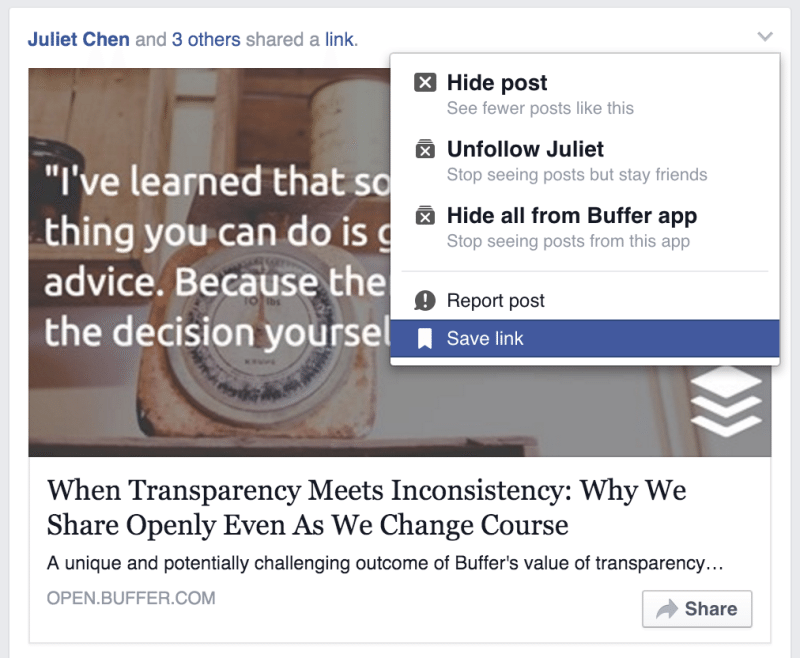
And on mobile:
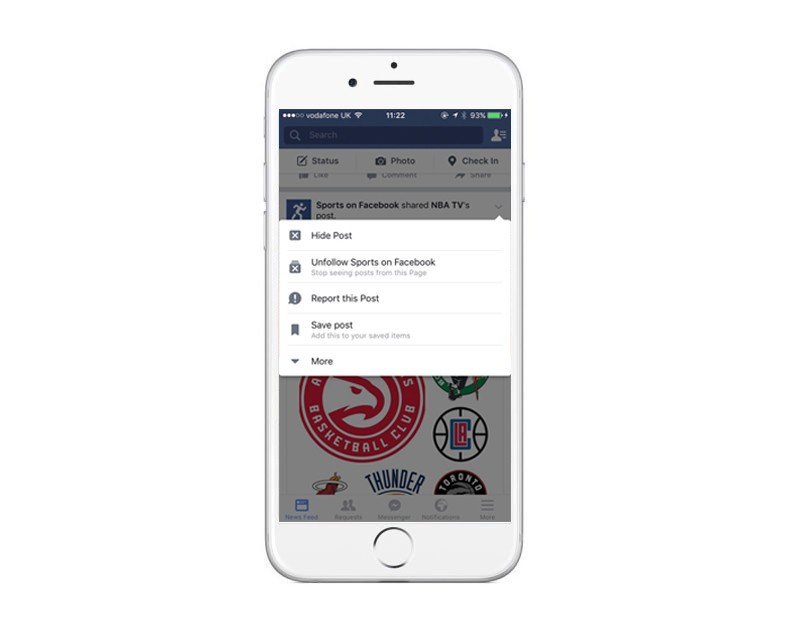
To find your saved posts again you can head to https://www.facebook.com/saved/ and on mobile tap ‘More’ from the navigation and then you should see an option for Saved:
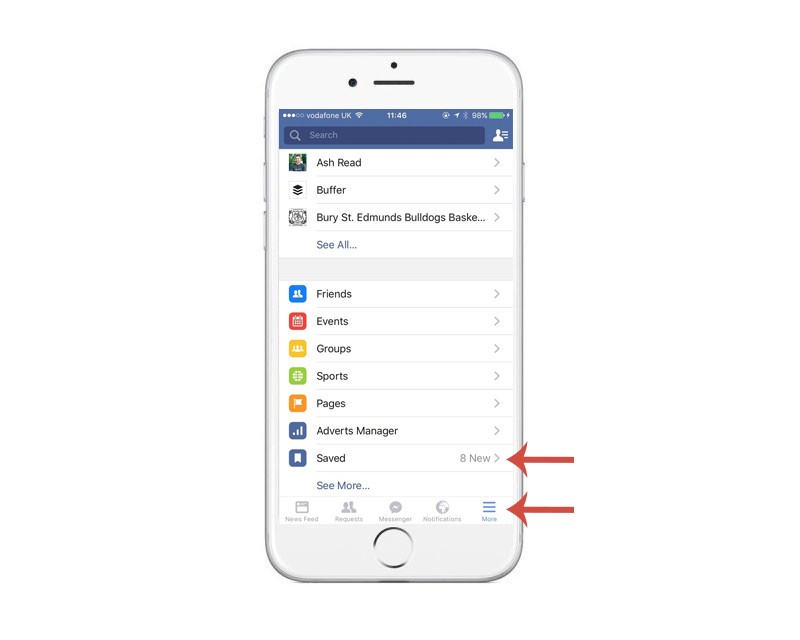
Buffer: “What Should I Post on Facebook?” 12 Facebook Tactics Working Right Now
7. Almost half of Facebook’s users are mobile only
Facebook now boasts more than 1.5 billion users, more than 1 billion of which use the service daily.
What’s even more interesting is that nearly half, around 46%, of Facebook’s users never log in to the desktop site and use Facebook only on mobile devices.
Will we soon hit the tipping point where the majority of Facebook users are mobile-only? VentureBeat predicts that we could reach that landmark at some time in 2016.
8. How to sync your Facebook Calendar with Google Calendar
I find this one is extremely helpful. My calendar is like my personal assistant, and I use it to plan and organize both my work and social schedules.
If you use both Facebook events and Google Calendar, combining the two is amazingly useful and pretty simple. Here’s how to do it:
Head over to Events on Facebook, and click on one of your ‘Upcoming events.’ Once you’re on the event page, click on the ‘Options’ button and select ‘Export Event’ from the dropdown, as shown below:
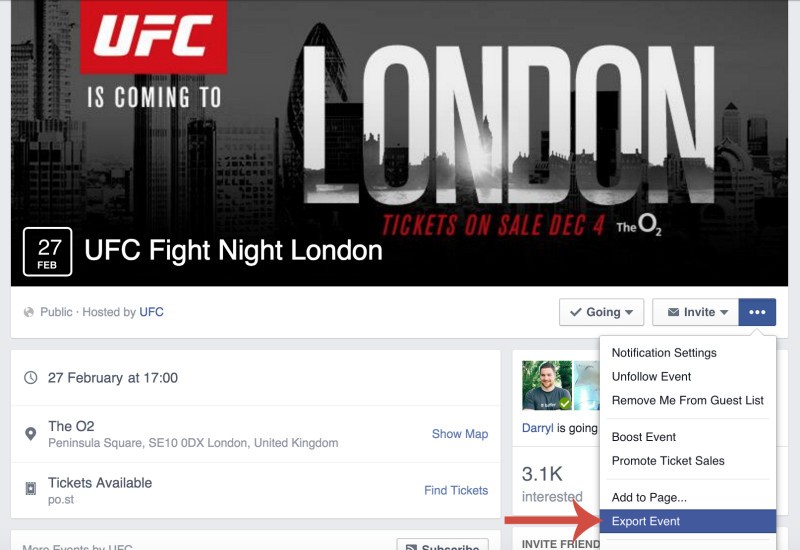
Next you’ll see the below lightbox popup. Here you’ll want to copy the URL under ‘Subscribe to all upcoming events on your calendar.’
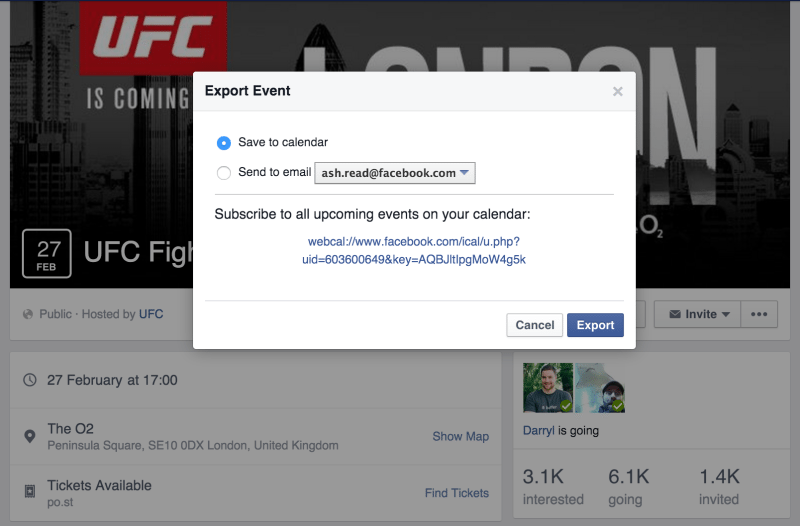
Once you’ve copied the URL, open up Google Calendar and on the left-hand side you’ll see an option called ‘Other Calendars.’ Click on the drop down next to ‘Other Calendars’ and choose “Add by URL” as shown below.
Once the lightbox opens up, insert the URL you copied from Facebook and your Facebook events will now sync with Google Calendar.
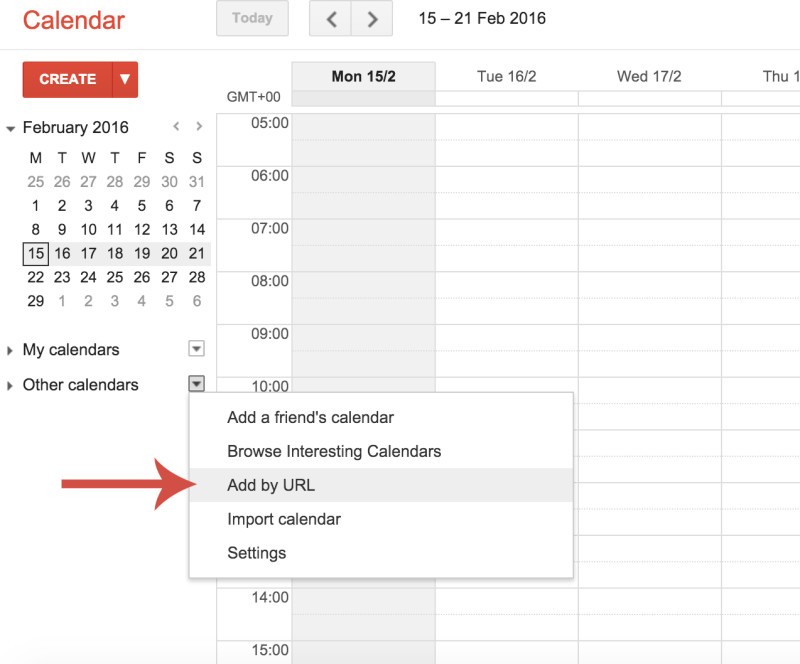
9. How to search your video library
Video has become an excellent way to reach and engage your audience on Facebook.
If your brand uploads a lot of video content to Facebook, there’s a useful Video Library feature that gives you a list of all the videos you’ve uploaded as well as multiple ways to filter them.
To find your Facebook Page’s Video Library, head over to your Page and click ‘Publishing Tools.’
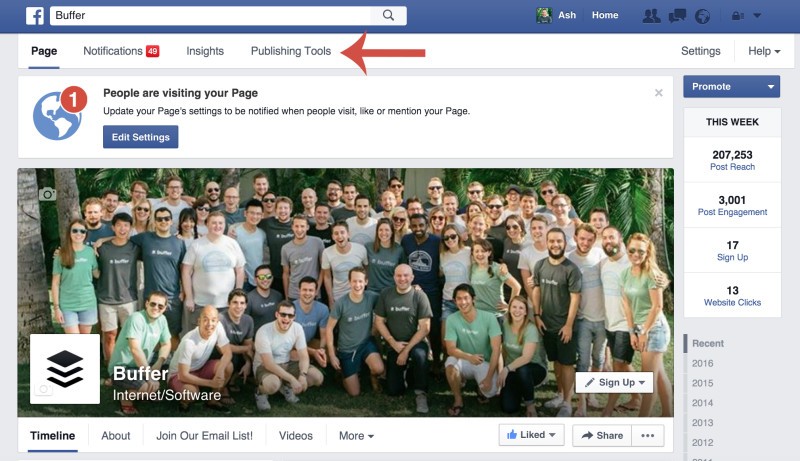
From the Publishing Tools page, then select the Video Library option on the left-hand side:
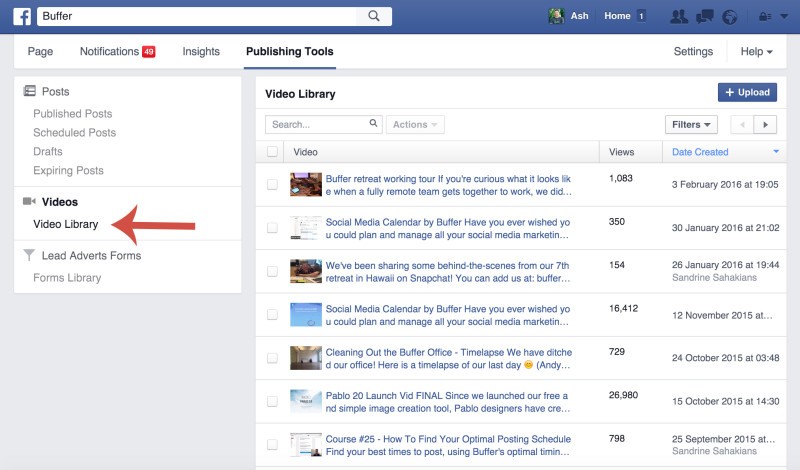
This is a great way to filter through all of your Facebook videos and discover your most successful content at a glance. You could consider re-sharing some of your most highly viewed content or using it as a blueprint for future video posts.
Buffer: The 7 Hidden Factors of the Most Effective Social Media Ads
10. Facebook’s audience is growing up in Western markets
Facebook was founded in 2004, and as its twelfth birthday approaches, it’s not just the social network that has matured. So have its users – in Western markets, at least.
Millennials make up a smaller share of Facebook’s users in Western markets than in developing nations. In the U.S., for instance, there are 17 percent more people over the age of 40 using the social network than their younger counterparts. Additionally, 33 percent of Facebook’s audience is under age 30. By comparison, in India and Indonesia, 75 percent of its users are millennials or younger.
11. Messenger has over 800 million users (is social media becoming more private?)
2015 was a huge year for Facebook Messenger and the app now has over 800 million monthly active users.
The below graphic shares some more of Messanger’s 2015 highlights:
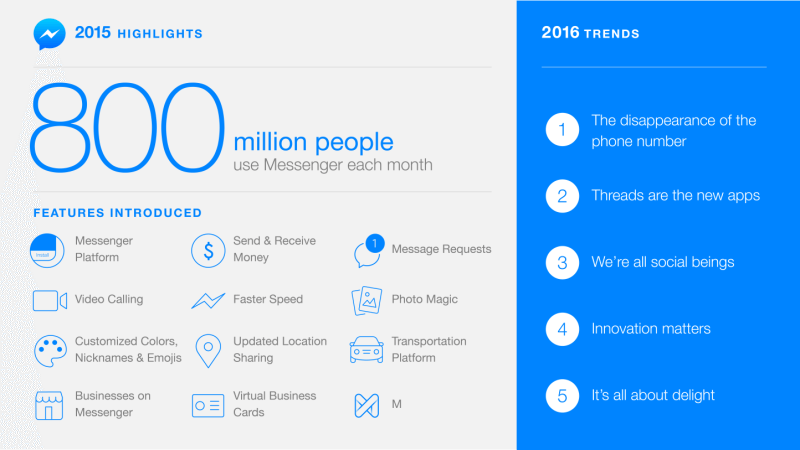
On Facebook’s Newsroom, David Marcus, VP of Messaging Products at Facebook explains that the Messenger team’s mission is to “make Messenger the best place to communicate with all the people and businesses in the world.
As Messenger, and more private social media and communication platforms boom, it feels like social media is becoming a little less about sharing our lives publicly, and more about connecting on a personal level with the people closest to us.
In their Digital in 2016 report, We Are Social note that they’re seeing an increased number of ‘private’ accounts on Instagram too, again backing up the feeling that social media is heading in a more private direction.
As marketers, this could also lead to a shift in the way we approach social media. Moving more towards value-led marketing that helps enhance customer experience and generate more favorable mentions and recommendations between individuals.
To succeed in this more personal social media environment, we need to get better at listening to individuals. Not just using social media as a way to share and promote marketing messages and campaigns.
More Must-Reads from TIME
- Donald Trump Is TIME's 2024 Person of the Year
- Why We Chose Trump as Person of the Year
- Is Intermittent Fasting Good or Bad for You?
- The 100 Must-Read Books of 2024
- The 20 Best Christmas TV Episodes
- Column: If Optimism Feels Ridiculous Now, Try Hope
- The Future of Climate Action Is Trade Policy
- Merle Bombardieri Is Helping People Make the Baby Decision
Contact us at letters@time.com